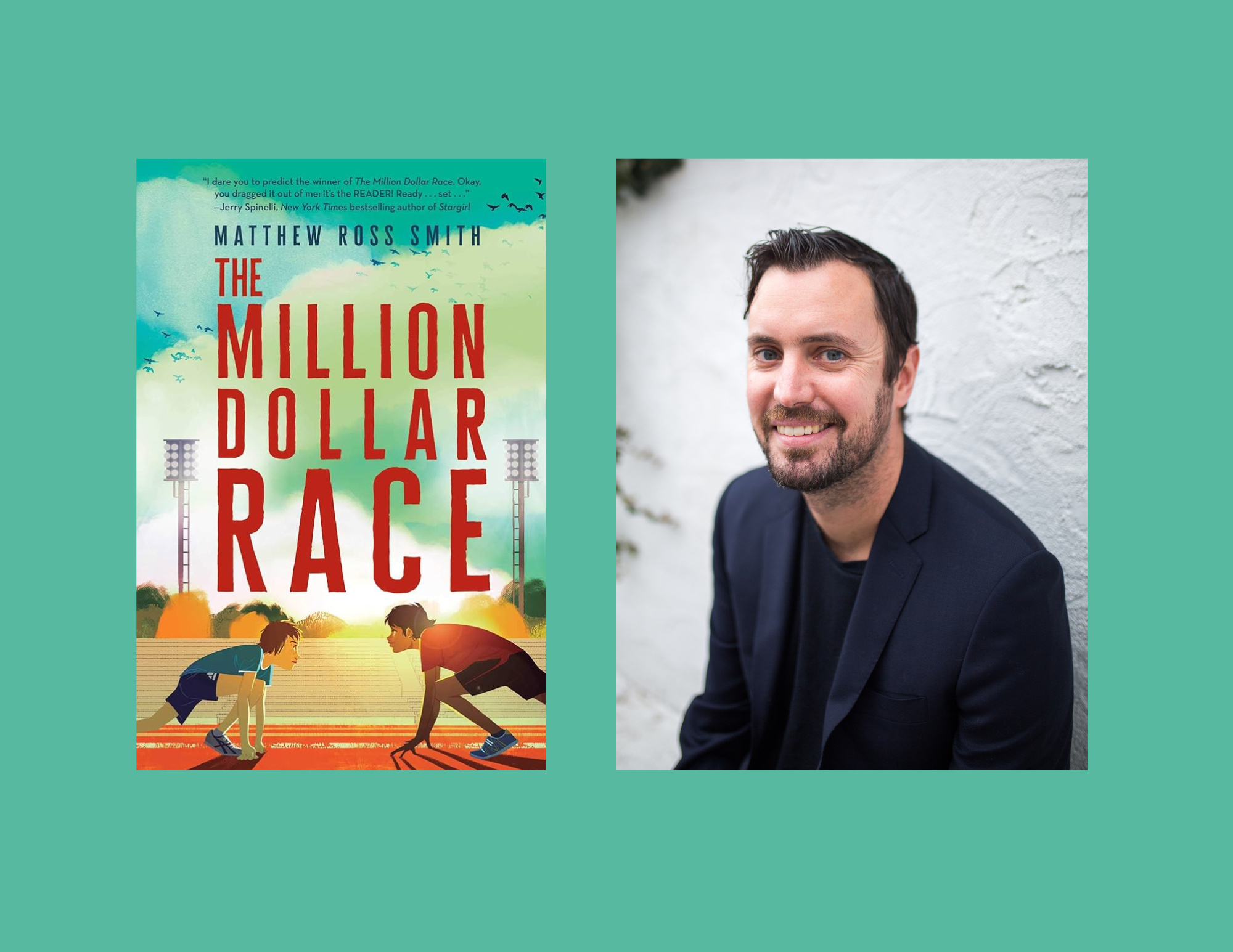Born and raised in Philadelphia, Matthew Ross Smith is a novelist and writer of The Million Dollar Race. He is currently an assistant teaching professor at Drexel University.
Simone Erachshaw: What made you decide you wanted to be a writer?
Matthew Ross Smith: I was probably a little slower with that realization than most authors. It wasn’t until high school. I remember in ninth grade, I had a teacher pull me aside and accuse me of plagiarism when I hadn’t plagiarized. They were like, ‘How did you write this?’ I started getting good feedback about my writing. My entrance into writing was through writing for the student newspaper, and at that time, I dreamed that I would be a sportswriter because I always loved sports. I thought it would be the coolest job. I would go to all the games, talk to the players, and write about them. When I got a little older and as I went through college, I really fell in love with fiction. At some point, I merged those two things together and started writing fiction about sports.
SE: Was there a specific moment or book that inspired you to write fiction?
MRS: I fell in love with reading in high school, but never really felt the deep emotional connection that some people had to books. The first one I remember that just really blew me away was the opening chapter to Slaughterhouse Five—by Kurt Vonnegut—that functions like a prologue. It just floored me, and I thought I didn’t know a book could do that to a person. I didn’t know a book could be funny like that. It just made me think, ‘Wow, could I try to do that?’ Like I was saying, it wasn’t until probably high school that I started reading novels that really captivated me. It’s interesting because my son is seven and he is fully in love with reading and writing in a way I wasn’t. I get this vicarious joy of watching him now fall in love with books and stories. He just follows me around telling me about the dragons in Wings of Fire. It’s really cool to get to watch him go through that in a different way.
SE: What personal connection do you have with sports? Did you play any of the sports that you talk about in your books, like racing or basketball?
MRS: I played basketball growing up. It was really my first obsession long before books. I’ve done some reflecting on that recently, and I kind of approached both in the same way. I remember going out in the backyard and just being obsessed with the process of shooting and the way the ball would feel as it left my hand. I was endlessly interested in that repetitive process. I’m obsessed with writing and approaching sentences in the same way. But I was fully a sports kid. I was losing my mind about the professional sports teams and excited going from season to season, supporting every team. I used to fall asleep listing to the sports talk radio. I still listen to sports talk radio in my car.
SE: What is your writing process? What goes on in your mind when you finish a book and you’re trying to start a new one?
MRS: It’s a messy process. I have found that, because I get obsessive with sentence making in the way I just described, I have to restrict myself. In the early stages, I’m just trying to figure out the story points and who the characters are. It is not helpful to be obsessing over making perfect, beautiful sentences. The way I’ve learned to get around that is I write by hand in the early drafts. In the office, I am surrounded by stacks of paper and legal pads. Recently, I’ve even started using my phone notes. But mostly, I just really like the act of writing on paper early in the process of trying to figure out the story, so that I don’t self-edit as much. Once I feel like I have some momentum going forward, then I’ll transition, and it’ll be maybe half writing on paper and half on the computer. Then, through many cycles of frustration and inspiration, a draft appears, and I just go through the process many more times until I’m happy with it.
SE: How long would you say that process takes for you?
MRS: It depends. For my two middle grade novels I’ve published, probably about a year each. I’ve been working off and on for a different project for about ten years. I just can’t get it to a place where I’m happy with it yet. But it’s never an immediate flash of inspiration and it’s done.
SE: Is there a mindset that you have to be in to write from the perspective of a middle schooler? Do you have to go back to your experience as a middle schooler?
MRS: I’m jealous of authors that can recall vividly what it was like to be in middle school. My memory doesn’t work that way. I can see all the major scenes in my life strung together, but I don’t really have a vivid memory of them emotionally. All I have to do is project myself backward, imagine, and empathize. I think that works out well because it forces me to be really honest.
SE: Is it difficult being an author and a professor? Do you feel like you have to prioritize one over the other?
MRS: I might be different in this answer, but I don’t think it’s difficult to be both. I think they work well together. I really enjoy teaching and being with students. There are times where I’m forced to articulate the most important things about writing. There are always times where I wish I had more time to write, as I think all writers probably dream of.
SE: What are some underlying themes you are trying to explore through sports fiction?
MRS: I would say that the themes arise organically. Anytime I try to start with a theme and then write a story around it, it feels dead. It just has to bubble up organically. What I’ve noticed looking backward, my characters are always striving for recognition and greatness, and they are obsessed with what they do, which I think reflects something about myself. There are social injustice themes in my second book. There are kids that are standing up to a greedy corporation and trying to make sense of how their dreams are just a profit to someone else. I’m not didactically trying to say anything about it. I’m just trying to have the character struggle with something that matters, and then use my perspective as an adult to imbue them with characteristics to overcome whatever problem they’re facing.
SE: Would you ever consider writing in a different genre?
MRS: The mysterious project I’m working on now is way different. It’s for adults and a totally different challenge. I’m open to that. I feel with sports writing, there’s an authenticity because I know that world well. But it’s also fun to try new stuff too.
Make sure to check out Matthew Ross Smith’s books. You can purchase The Million Dollar Race here. To learn more about Matthew Ross Smith, click on his website.

Simone Erachshaw (she/her) is a senior at Drexel University pursuing BA in Communications while minoring in Marketing and Sports Management. On campus, she is involved in Delta Gamma and a member of PRSSA. In her free time, she enjoys reading, social media, photography, and journaling. After graduation, she hopes to get a job in sports marketing.
